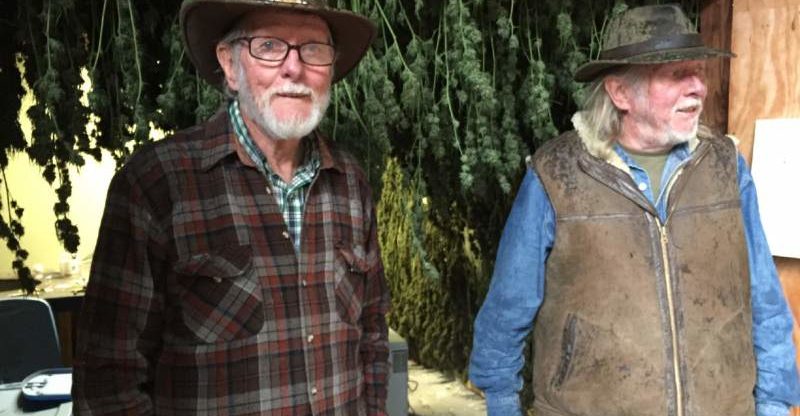ROBIN ABCARIAN IS A COLUMNIST FOR THE LOS ANGELES TIMES.
COVELO – You don’t end up in Round Valley, one of Mendocino County’s finest cannabis-growing micro climates, by accident. It is well northeast of Highway 101, along a winding mountain road that follows the curves of Outlet Creek and the Middle Fork of the Eel River.
After 45 minutes, the valley comes into view. From a lookout called Inspiration Point, even in a light drizzle, Round Valley is a picture of bucolic grace, with wheat-colored fields, black cows and green orchards spreading out below.
Many of those groves conceal marijuana plants — or trees as they call them around here — which flourish in the rich alluvial soil of the valley’s fertile bottomland.
The highway through the valley is dead straight, punctuated by one town, Covelo, population about 1,200. Just past town, I pulled onto a farm owned by Robert and John Cunnan, identical 76-year-old twins who were born in Glendale and left Southern California more than 40 years ago seeking a better life.
“We came here with the back-to-the-land movement,” Robert told me as we stood in front of a shed where dozens of fragrant cannabis stalks were hanging to dry.
For $6,500, the brothers bought 10 acres with a creek down the middle. They built craftsman-style homes for themselves and raised families on food they grew in their gardens and money earned as cabinet makers for what they call “mom-and-pop” businesses — restaurants, coffee shops and boutiques. They got by, but barely.
“A friend of mine came up here in 1985, grew marijuana and sold it for $2,000 a pound,” Robert said. “And that’s when I thought, ‘You know, you might be able to make a little money doing this.’ ”
This, pretty much, is the very thought that has crossed the minds of untold thousands of Mendocino County residents, beleaguered by the crashing logging and fishing industries and willing to flout the law to support their families.
“At one time, I sold stuff for $5,000 a pound,” Robert said. “It was worth more than gold. Now, it’s down to $1,200 to $1,500. But cannabis allowed me to finish my house and get comfortable.” (Yields vary wildly, but in these parts, each tree can produce two to four pounds or more.)
“I consider myself a teacher and a woodworker,” said John, who commutes to Ukiah once a week to teach woodworking in two schools. “The cannabis is just to fill in where the teaching and woodworking don’t pay the bills.”
I assumed the Cunnans would be strong proponents of legalizing cannabis for recreational use. As it turns out, they oppose Proposition 64, which would regulate and tax cannabis for the adult market.
And they are not alone.
Many small marijuana farmers, as it happens, see Proposition 64 as a threat to their way of life.
They believe that a legal, regulated cannabis market could open the floodgates to corporatization of the industry, pushing taxes up and prices down, perhaps forcing them out of business altogether.
“The thing you need to realize is that this is a movement that is becoming an industry,” Robert said. “The movement was organic gardening, the back-to-the-land, alternative lifestyle. We were the original generation that came out here and set up our pot gardens.”








